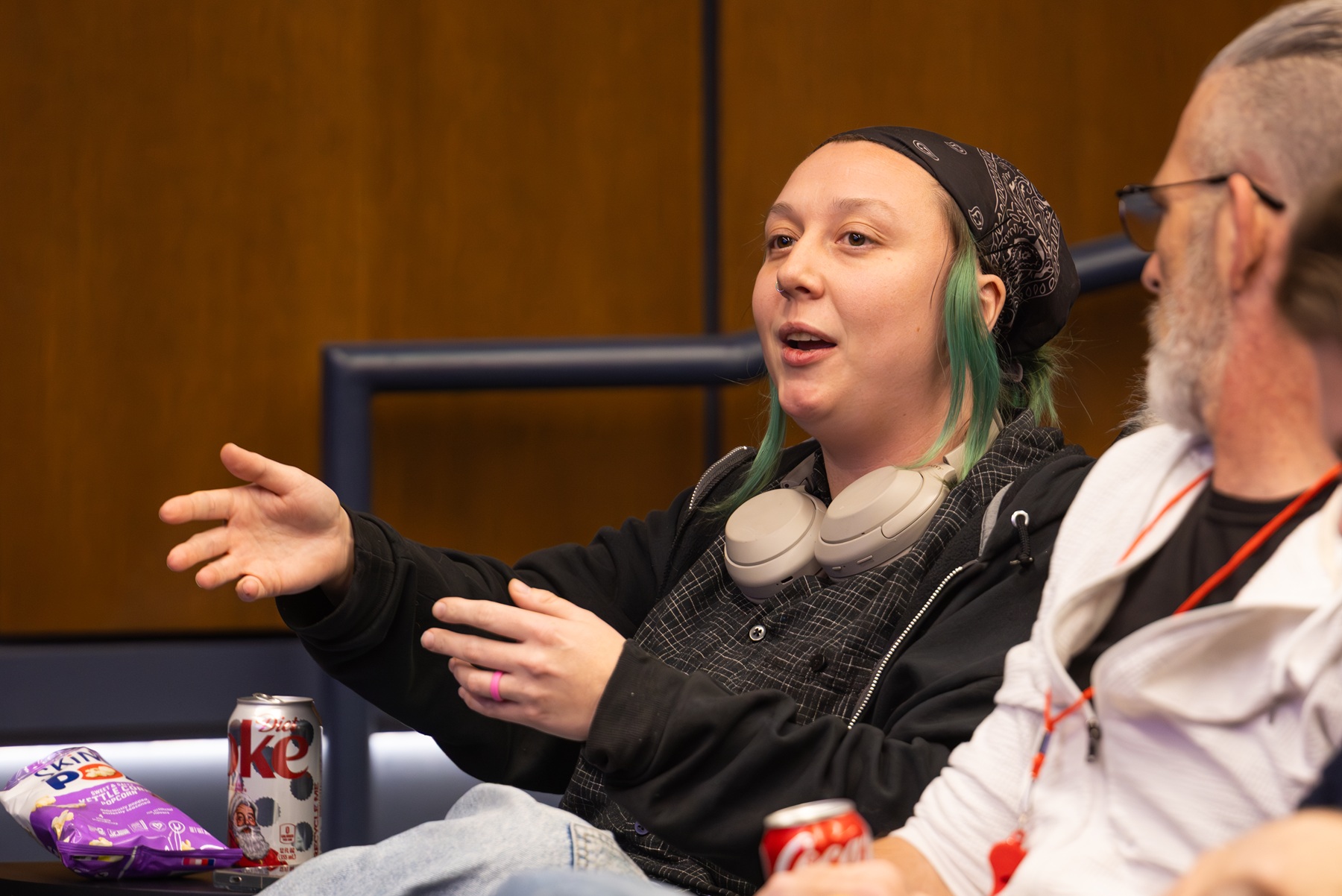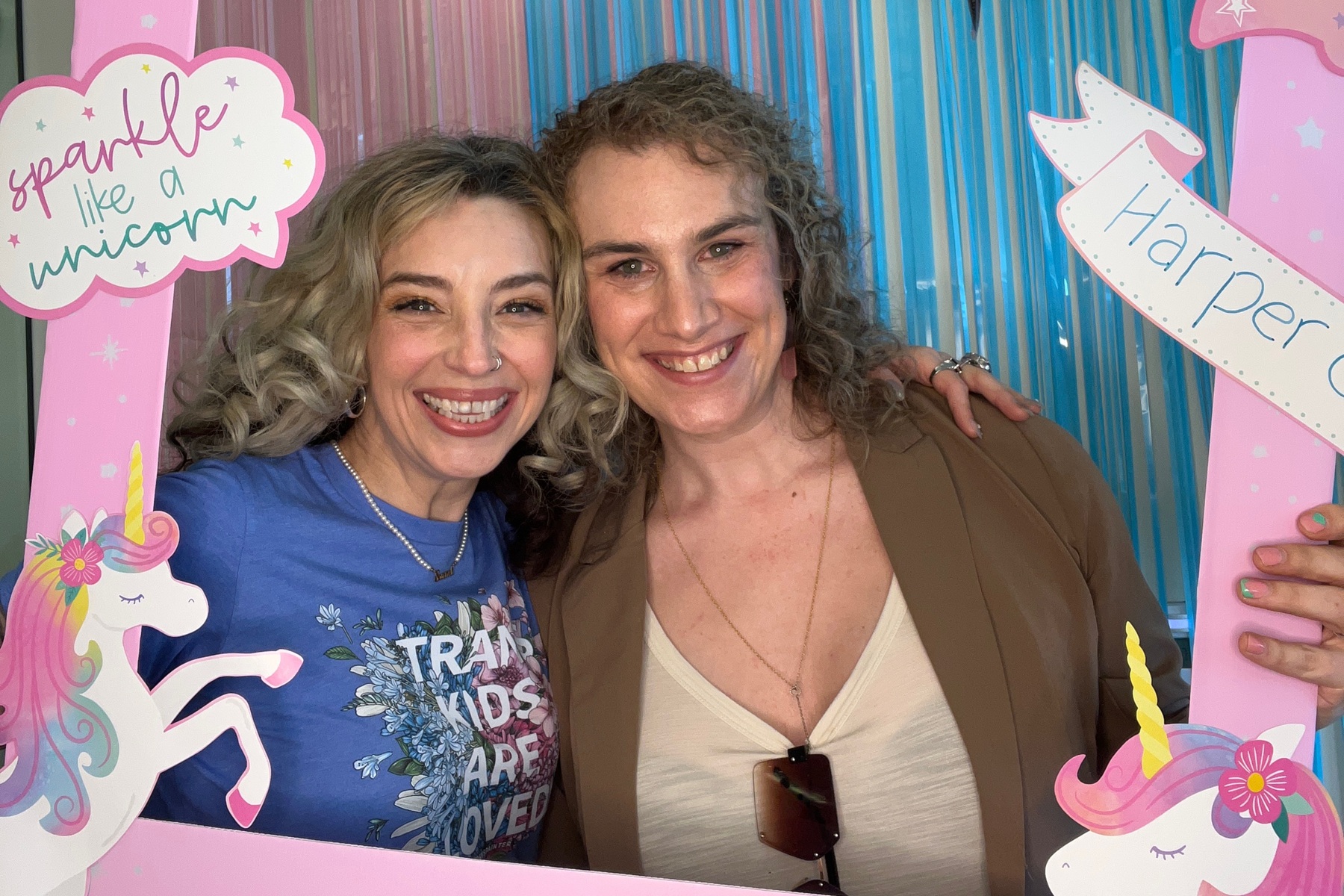

Harper College student JP, who identifies as nonbinary and queer and uses they/them pronouns, participated in a pair of recent campus events honoring Transgender Day of Remembrance.
As a student at Harper College, JP discovered more than academic direction – they found a place where they truly felt recognized for who they are.
“Harper was the first place that my identity was validated across the board,” said JP, who identifies as nonbinary and queer, and uses they/them pronouns. “It was the first time I saw educators who had the same experiences as me.”
The 30-year-old student talked about how this validation has permeated all aspects of their Harper experience – whether participating in sociology and education courses or joining Harper’s Pride Club and becoming a student aide in the college’s Cultural Center. JP recently took part in two Harper events connected to Transgender Day of Remembrance (TDOR), a day that commemorates transgender, nonbinary and gender non-conforming individuals who have been killed or harmed because of violence, prejudice and abuse.
In the lead-up to TDOR, Harper’s Office of Diversity, Equity and Inclusion partnered with Pride Club and Latinos Unidos to host a discussion and screening of the short film The Machine in the Film Lab. Written and directed by Mason Bendewald, the movie involves a fraught debate about a transgender high school athlete and was filmed at Harper. Nonbinary performer Chris Amos spoke about acting in the film and what it was like to portray a character with a narrower view of gender.
On TDOR, November 20, Harper’s Cultural Center hosted a more intimate event. Students joined faculty and staff to both honor those who have lost their lives in the past year and take part in activities those people enjoyed while they were alive. The group discussed the value of third spaces – welcoming environments beyond home and work where trans and gender-diverse people can find community – and talked about the rich history that shapes these connections.
“It’s important to me because it’s about stepping back into our history and acknowledging those who came before us,” JP reflected. “We’ve talked in Pride Club that there’s such a disconnect between the current generation and why the trans community exists the way we do. It’s important to highlight this.”
It’s not the only way these connections are made on Harper’s campus. In addition to being an assistant professor in the Music Department and Pride Club advisor, Dr. Sadie Hochman-Ruiz facilitates Trans Tea Time, a monthly gathering designed to support trans-identifying and gender non-conforming students, faculty and staff. As someone who has more experience living as an “out” trans person than most students, Sadie compares her role to a social worker.
“I’m hosting a space for them to ask questions to learn more and reflect on themselves. Sometimes it’s just talking. Sometimes we do a drag makeup tutorial or gender-affirming clothing swaps,” she said. “We want to make sure there’s at least one place where someone loves them.”
Sadie believes that showing love for trans Harper students is even more important in the face of the current political environment, as well as statistics that show the prevalence of suicide among and violence against transgender and gender-diverse individuals. Multiple studies and reports show increased mortality rates for transgender people, with higher rates of violent deaths and suicide. Black trans women are disproportionately murdered.
“It’s hard to see hope right now. I think that the place where hope may exist is just with more people knowing who we are,” Sadie said. “Although more people have heard about trans people today than in the past, a lot of people don’t know who we are. A lot of people don’t know the stories of trans people. They hear narratives that fit into certain mainstream tropes. My hope is to increase the number of people who have met a real live trans person.”

Dr. Sonnet Gabbard, coordinator for LGBTQ+ student diversity initiatives at Harper (left); and Sadie Hochman-Ruiz, assistant professor of music; co-advise the college's Pride Club.
Over the past 23 years, few people have shaped LGBTQIA+ inclusion at Harper as deeply as LaVonya Williams, a faculty member in Student Development and longtime campus leader. She joined Harper in 2002 and launched or co-founded several programs that still anchor the college’s diversity, equity and inclusion work today – including Safe Zone training for employees and the SAFE (Staff, Administrators and Faculty for Equality) employee resource group focused on LGBTQIA+ advocacy and education.
LaVonya, who is an LGBTQ+ professor, said Harper has been recognizing TDOR since SAFE began in 2014, stemming from the group’s early efforts to bring visibility to trans lives and experiences.
“SAFE started a lot of the work that we’ve done, and over the years the infrastructure at Harper has grown so much stronger,” she said. “The Cultural Center was reopened, more employee resource groups came into being, and we now have Pride advisors and queer faculty supporting students. The experience is much more inclusive now – and even acknowledged in ways it wasn’t before.”
LaVonya highlighted other elements that show Harper’s progress, from hiring a coordinator for LGBTQ+ student diversity initiatives (Dr. Sonnet Gabbard) and establishing Trans Tea Time to constructing more all-gender restrooms and embracing the chosen name policy that encourages students to affirm their preferred names within Harper’s student information system. This includes their student profiles, class rosters, ID cards and more. A significant accomplishment in affirming trans and nonbinary students is the recent inclusion of an option for new students to acknowledge their gender identity on the Harper application.

Dr. Sadie Hochman-Ruiz (left) and Professor LaVonya Williams are campus leaders when it comes to affirming the identities of gender non-conforming students and employees at Harper.
Due to evolving career plans, JP has attended Harper at separate times in the past 12 years, seeing the college change from a student’s perspective. After earning an Associate in Arts Degree in 2025, JP is pursuing a bachelor’s degree in psychology from Northern Illinois University through Harper’s University Center. Along the way, they’ve attended courses taught by LaVonya and Sadie and worked alongside Sonnet in the Office of DEI, while participating in clubs and events led by all three.
“For me it’s important to live authentically in my self-expression,” JP said. “Nobody can tell me how to be, how to think. We’re visible and we need to be persistent in that visibility.”
While Harper’s growth in these areas is worth celebrating, everyone acknowledges that there’s more work to be done. Leaders in Harper’s LGBTQIA+ community would like to see increased connection between Harper and external trans communities in the Chicago area. All are concerned for the safety of trans students and employees and want to ensure Harper’s campus is a safe space.
“I think that right now we are trying to navigate a world where we don’t always know who’s around us, what they’ve said online or behind closed doors,” Sadie said. “I’m hoping that trans people, here at Harper and everywhere, can see who is willing to stand up for them.”